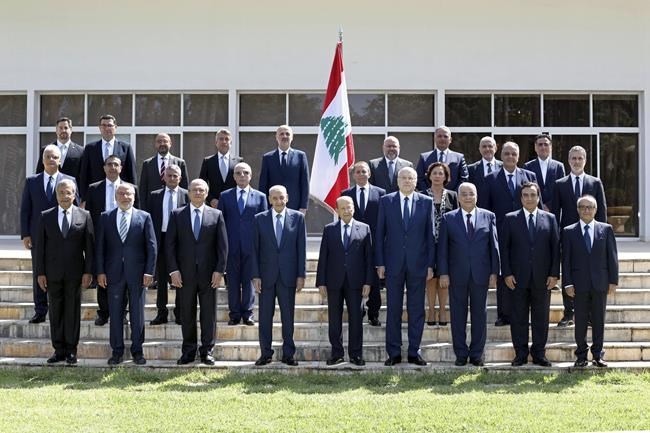
In this photo released by Lebanese government, members of the new government pose for an official picture at the Presidential Palace in Baabda, east of Beirut, Lebanon, Monday, Sept 13, 2021. Front row from left to right are Defense Minister Maurice Slim, Interior Minister Bassam Mawlawi, Deputy Prime Minister Saadeh Shami, Parliament Speaker Nabih Berri, President Michel Aoun, Prime Minister Najib Mikati, Foreign Minister Abdullah Bouhabib, Information Minister George Kordahi, Minister of Youth and Sports George Kallas. (Dalati Nohra/Lebanese Official Government via AP)
Republished September 17, 2021 - 3:14 AM
Original Publication Date September 17, 2021 - 2:11 AM
BEIRUT (AP) — Lebanon’s incoming finance minister signed a contract on Friday with a New-York-based company to conduct a forensic audit of the country’s central bank, a key demand of the international community to restore confidence in the crisis-struck country.
Alvarez & Marsal had pulled out of an earlier deal late last year, complaining that after months of work it was not able to acquire the information it needed to conduct its audit. The withdrawal was a blow to calls for accountability in the country mired in decades of corruption which many consider a key reason for the economic meltdown.
A forensic audit has been a key demand by the International Monetary Fund and international donors who have said that they will not give money to Lebanon without major reforms to fight corruption and widespread waste in state institutions. Satisfying the demand was complicated by an internal power struggle between different groups in Lebanon who disagreed on the size of the financial problem and who is to blame.
Lebanon, meanwhile, struggled without a fully functional government for more than a year amid one of the world's worst economic and financial crises. A caretaker government advocated a forensic audit after the country defaulted on paying back its massive debt for the first time in 2020.
A new government was named earlier this month and reinstating the forensic audit was practically the first contract signed by Finance Minister Youssef El Khalil. A former central bank official since 1982, El Khalil was last the executive director of the central bank’s financial operations department. According to his resume, the position allowed him to participate in formulating the bank’s contribution to reform programs for Lebanon.
But there were concerns that little has changed to secure different results this time.
Mike Azar, an independent debt advisor, said problematic issues have not been addressed, such as securing direct access to the central bank’s accounting, information technology systems and staff. There is no independent oversight of the audit. The fact that the current minister is a former central bank official appears to be a conflict of interest, Azar said.
“He should recuse himself from overseeing the audit,” Azar said. “If these issues are not addressed, the audit is unlikely to be successful.”
El Khalil’s office said the company will present a report 12 weeks after it starts its audit. No date has been given for when they will begin.
The country’s current economic and financial crisis, considered by the World Bank as one of the world’s worst in the last 150 years, is rooted in decades of corruption and mismanagement. The small country of 6 million, including Syrian refugees, have been grappling with shortages of fuel, medicine and basic goods as foreign reserves dwindle and the economy contracts.
Cash-strapped, the new government said one of its priorities would be to lift subsidies on basic goods.
On Friday, the incoming minister of energy announced new price hikes for gasoline of nearly 40%. This raises the price of 20 liters of 95-octane gas to 174,300 Lebanese pounds, and 98-octane gas to 180,000 Lebanese pounds. That is between $116 and $120 respectively, according to the official rate.
But amid the economic crisis, the local currency has been in a free fall, and there are multiple exchange rates, including one set by the central bank to organize imports. The currency pegged for 30 years to the dollar at 1,500 Lebanese pounds now trades on the black market at ten times that rate.
Aside from supply shortage, the multiple exchange rates and imminent plans to lift subsidies caused massive hoarding, further adding to Lebanon's hardship. Long queues outside gas stations have often descended into chaos or violence and caused major traffic jams. Gas stations rationed the amount of gasoline they distributed. Prices of diesel for power generating, amid an almost non-existent national grid, have increased more than ten fold — making it impossible for many families to secure electricity for themselves. Many businesses had to shut down.
News from © The Associated Press, 2021